 |
| Gabriele Mainetti on the streets of Rome with Anne-Katrin Titze: “In Once Upon A Time In America you don’t even have the American Dream like Scarface does.” |
In the second instalment with Gabriele Mainetti we touch upon Robert De Niro and Al Pacino in Brian De Palma’s Scarface, Sergio Leone’s Once Upon A Time In America, John Ford and John Wayne, Roberto Rossellini’s Rome, Open City, Michael Haneke’s comment on Steven Spielberg’s Schindler’s List, Quentin Tarantino’s Inglourious Basterds, Tod Browning, and the painful process of accepting yourself in Freaks Out, co-written with Nicola Guaglianone.
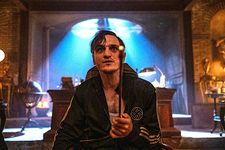 |
| Gabriele Mainetti on Franz (Franz Rogowski): “Franz says no and Matilda can’t say no and says yes with all the pain.” |
There’s Franz (Franz Rogowski, star of Giacomo Abbruzzese’s Disco Boy, a highlight of New Directors/New Films in New York), the German pianist blessed with 12 fingers and the ability to see the future. He wants the “freaks” on his side. But what exactly is his side? Israel (Giorgio Tirabassi), the circus director, who assembled his impressive, multi-faceted attractions - Fulvio (Claudio Santamaria) the Wolf Man, a real renaissance connoisseur, Mario (Giancarlo Martini) the Magnetic Man, short in stature, tall in drive, the Cencio (Pietro Castellitto) the Albino Boy who can communicate with insects and is less gentle than his goldilocks promise, and Matilde (Aurora Giovinazzo), the Electric Girl whose powers could change the outcome of the war, if she knew how to use them.
What makes someone a freak in 1940s Italy? That depends on a million things in a time of changing alliances in a world spinning silently around a center that does not hold in Gabriele Mainetti’s Freaks Out (aka Freaks vs. the Reich), set among circus folk.
From the streets of Rome, Gabriele Mainetti joined me on Zoom during the 21st edition of Open Roads: New Italian Cinema in New York for an in-depth conversation on Freaks Out.
Anne-Katrin Titze: What I liked about the character of Matilde is the fact that she does not fully have control over her powers. And that she is discovering them throughout the film. They might not be what she thought they were, as in the great moment with the tiger - the tiger kisses! It’s a nice trajectory for her.
In folktale tradition, characters like her do not usually end up with helpers along the way. Think Dorothy [in The Wizard Of Oz] and her encounters or the seven dwarfs for Snow White. It’s an interesting departure you are making. Tell me a bit about Matilde!
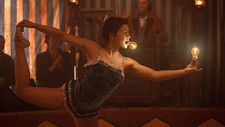 |
| Gabriele Mainetti on Matilde (Aurora Giovinazzo): “Accepting yourself is a painful process.” |
Gabriele Mainetti: Matilde! There’s a line by Fulvio, the hypertrichosis guy, who says “You’re normal! You’re not facing the things that we are.”
AKT: He hasn’t seen E.T. [the Extra-Terrestrial]!
GM: No, he hasn’t seen E.T.. Her character, who is normal, is the vehicle of the audience, whom you follow basically. What was interesting to me was to put this character to the limits, towards her identity. I can’t stand how people talk about diversity, because diversity is a noun that describes how you feel about somebody that you might not understand and you put a judgement on by saying he is diverse.
But it’s a matter of identity. In the movie, her inner self comes out, this identity that makes her a freak. It is so strong that it becomes like an angel at the end, a German calls her “the monster.” This is what we have inside. And Franz is a freak himself but renouncing his identity by chopping off his fingers. Wanting to belong also kills you, because everybody’s different. That’s the beauty of it. Franz says no and Matilda can’t say no and says yes with all the pain. Accepting yourself is a painful process.
AKT: You end with a big battle - maybe we shouldn’t talk about that.
GM: I know, many people told me that it’s long. But many people told me that they liked it more the second time because they understood the geography more.
AKT: Tell me a bit about the choice of these four characters around Franz. There is Matilde and as he calls them, the Wolf Man, the Insect Boy, the Magnet Man. Did you have other special powers in the script that got discarded?
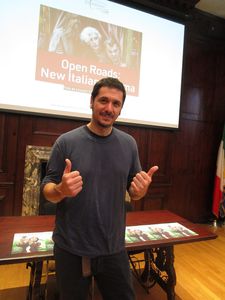 |
| Gabriele Mainetti at the Open Roads: New Italian Cinema luncheon in New York Photo: Anne-Katrin Titze |
GM: No, the only one was … They were always these four but we needed to define better what powers they had. Even Mario, the magnet dwarf, we needed to define how strong was his power. He couldn’t move a train for example but he could move small things. Fulvio, the wolf man, could beat up people and bend a bit of iron, nothing more. Who had very special power is Cencio, the albino guy that talks to insects. In the first draft he could talk to horses and tigers.
AKT: I see!
GM: It was too much so we shrunk down his power. I’m kind of sad that in the draft we wrote and rewrote we lost that Matilde was like a nuclear bomb. This person was more powerful than the hydrogen bomb. This is the person they’re looking for. I’m kind of sad that we lost that.
AKT: That makes sense. But I like that you have a character just talking to insects, I have never seen that before.
GM: It is a very Italian movie because the characters are full of flaws. They are cowards, they are egotistic, they don’t want any responsibility, they just want to be free in this place they know best, which is the circus. So they don’t care about each other too. But when you move into the inner parts, they’re a family again. That’s what [Tod] Browning was, Freaks are a strong family, that’s the thing besides the freakiness that I loved about the movie. In this movie, the guy who looks like a beast is very educated, he reads books.
AKT: And speaks several languages.
GM: He is always very elegant, the women love him. On the contrary, the albino who looks like an ethereal person and very regal, he talks and is always dirty, and the dwarf has an immense sex drive. Also the bad guy, the Nazi guy, he is a freak, he is an artist. I always want characters who have conflicting parts. That’s close to Sergio Leone, for example.
When I look at the movies of John Ford, John Wayne always knows the difference between good and bad. And with Sergio Leone - they call it the killer of Westerns, the killer of Noir, because In Once Upon A Time in America you don’t even have the American Dream like Scarface does.
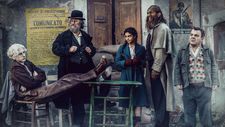 |
| Cencio (Pietro Castellitto), Israel (Giorgio Tirabassi), Matilde (Aurora Giovinazzo), Fulvio (Claudio Santamaria), and Mario (Giancarlo Martini) |
The main character, played by Robert De Niro, his best friend steals the love of his life, he kills the other friend and takes his life and comes back at 65, you don’t know what he did and he lost everything. He made it more Roman, he was really from here, Sergio Leone [Gabriele points to his window]. When I look at his movie, there are some lines that are so from this area.
AKT: The specifics in your film are also interesting. The only factual name you bring up is that of Commander Albert Kesselring.
GM: That’s true.
AKT: Because he was responsible at that time?
GM: He was responsible, a very bad guy. Jews and Romans gave him money for the deportation not to happen. He took the money and did the deportation too.
AKT: Massacres of civilians and really awful actions!
GM: Articles that came out when the movie was in Venice, written by some American critics, I understood that they didn’t know history at all, nothing. We were allied with the Germans before we became a Republic in ’45.
When you watch the film Rome, Open City, we made Rome an open city, so we were neutral. That’s when the Nazis started occupying Rome. It wasn’t like Poland. But we had our resistance and there was an attack on the Germans and for every attack on a German there were ten Italians and they took them like that, women, children.
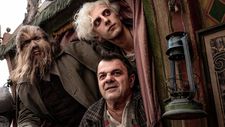 |
| Fulvio (Claudio Santamaria), Cencio (Pietro Castellitto), and Mario (Giancarlo Martini) on the move |
The worst moment of that time is the deportation of the ghetto because they took 1600 Jews and only 16 people came back. They went to Auschwitz, it took like a month and a half to arrive there. The train stopped in Milan and it took Jews from up North too and they killed basically everybody.
AKT: You included a lot of that in your movie as well.
GM: I know you can’t include some things in the article or you’d spoil it too much, but basically I put in a lot of the cinema that I love. Who were the freaks of diversity at the time? The Jews. And that’s the crazy thinking. And you take the lesson from Tarantino that you can invert history because it’s cinema. Cinema is your dream and you dream that this train never left the station or never arrived there. I don’t agree with what Spielberg said that if you go back to history you’ve got to pay respect and do everything perfectly.
But he was also put against the wall by Michael Haneke, who said - Don’t fool me because what you did with Schindler’s List in the shower - that’s a moment of thrill, that’s a moment of cinema, it’s not the truth. When you have the piano player in the ghetto and the flash of the guns that light the guy in silhouette, that’s beautiful, but that’s cinema. It’s not being respectful to history. I kind of understand that. Your truth is in what you say. The best document you can have are the people.
You just got to tell your version of the story and make it interesting. You’ve got to remind the kids even if it’s in an adventure way what happened. So I was happy that the Jewish community of Rome loved this movie so much. The movie was loved in Israel too. That was really important to me.
Read what Gabriele Mainetti had to say on Franz Rogowski, Roberto Rossellini, Vittorio De Sica, and more on Freaks Out.
Freaks Out (aka Freaks vs. the Reich) is opening theatrically and Video on Demand in the US on Friday, April 28.





















